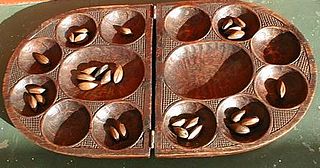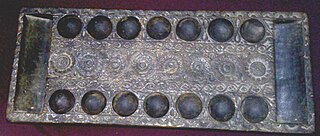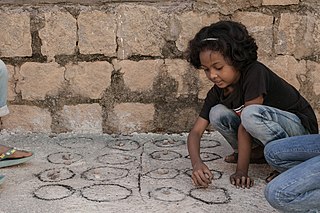
A strategy game or strategic game is a game in which the players' uncoerced, and often autonomous decision-making skills have a high significance in determining the outcome. Almost all strategy games require internal decision tree style thinking, and typically very high situational awareness.

Oware is an abstract strategy game among the Mancala family of board games played worldwide with slight variations as to the layout of the game, number of players and strategy of play. Its origin is uncertain but it is widely believed to be of Ashanti origin.
Ba-awa is a mancala from Ghana. Although played in some of the same regions as Oware, it is simpler and in traditional societies is considered a game for women and children. Ba-awa is related to games j'erin and obridjie played in Nigeria. It is also similar to mancala game anywoli played at the Ethiopian-Sudanese border.

Bao is a traditional mancala board game played in most of East Africa including Kenya, Tanzania, Comoros, Malawi, as well as some areas of DR Congo and Burundi. It is most popular among the Swahili people of Tanzania and Kenya; the name itself "Bao" is the Swahili word for "board" or "board game". In Tanzania, and especially Zanzibar, a "bao master" is held in high respect. In Malawi, a close variant of the game is known as Bawo, which is the Yao equivalent of the Swahili name.
Eson xorgol is a mancala game played by Kazakhs in western Mongolia.

Southeast Asian mancalas are a subtype of mancala games predominantly found in Southeast Asia. They are known as congka or congklak in Indonesia, congkak in Malaysia and Brunei, and sungkâ in the Philippines. They differ from other mancala games in that the player's store is included in the placing of the seeds. Like other mancalas, they vary widely in terms of the rules and number of holes used.
ǁHus (also spelled Hus or ǁHüs, in a minor variant called Owela is a traditional mancala played by Nama, Herero, Kwangari and other related ethnic groups from Namibia and neighbouring countries. It is related to the Omweso family of mancala games played in Eastern and Southern Africa. Although this is an abstract strategy game, consequences of individual moves are so hard to predict that it can be considered, to some extent, a game of chance.

Pallanghuzi, or Pallankuli, is a traditional ancient Tamil mancala game played in South India especially Tamil Nadu. Later the games were spread to other places including Karnataka, Andhra Pradesh and Kerala in India as well as, Sri Lanka and Malaysia. Variants are called as Ali guli mane, Vamana guntalu, and Kuzhipara. The game is played by two players, with a wooden board that has fourteen pits in all (hence the name from the words fourteen pits. There have been several variations in the layout of the pits, one among them being seven pits on each player's side. The pits contain cowry shells, seeds or small pebbles used as counters. There are several variations of the game depending on the number of shells each player starts with.

Ali Guli Mane is an abstract strategy board game of the mancala family, from Karnataka in South India. It is known as Chenne Mane in Tulunaadu Akal patta in North Karnataka. The name of the game, like that of many mancala games across the world, is simply a description of the board used: it means a "wooden block with holes". It is similar to Pallanguzhi from the neighbouring state of Tamil Nadu. There are also similarities with the traditional Malay mancala game Congkak.
Andada is a traditional mancala game played by the Kunama people of western Eritrea. It closely resembles other mancalas from East Africa such as Enkeshui and Layli Goobalay.
Anywoli is a traditional mancala game played by the Anuak people of the Gambela province, in Ethiopia, as well as in the Akobo, Pochalla and Jokau regions of Sudan. The name of the game means "bringing to life". Anywoli has similarities to mancalas found in Nigeria and Ghana, such as Ba-awa and Obridjie.
Aw-li On-nam Ot-tjin is a traditional mancala game played by the Penihing people of Borneo. The first transcription of the rules of the game is due to norwegian ethnographist Carl Sofus Lumholtz. Despite its origin, Otjin is similar to african mancalas such as Ba-awa (Ghana) and quite different from most Asian mancalas.
Hawalis is a traditional mancala game played in Oman as well as Zanzibar, where it is known as Bao la Kiarabu, with slightly different rules. It is closely related to African mancalas such as Bao, Njomba, Lela, Mulabalaba (Zambia), Muvalavala (Angola) and Tschuba.

Katro is a traditional mancala game played by the Betsileo people in the Fianarantsoa Province of Madagascar. The game was first described by Alex de Voogt in 1998.
Kisolo is a traditional mancala game played by the Luba, Lulua and Songye peoples of DR Congo and Zimbabwe. It is closely related to other East African mancalas such as Bao, Bao Kiarabu, Coro and Isolo.
Krur is a traditional mancala game played by the Hassaniya people in western Sahara, along the border of Nigeria and Mauritania, in southern Morocco, in Algeria, in northern Senegal, in Mali and in Niger. It is a children's game, very close to other simple African mancala such as Layli Goobalay (Somalia) and Nsa Isong (Nigeria).

Mangala is a traditional Turkish mancala game. It is strictly related to the mancala games Iraqi Halusa, Palestinian Al-manqala, and Baltic German Bohnenspiel. There is also another game referred as Mangala played by the Bedouin in Egypt, and Sudan, but it has quite different rules.







